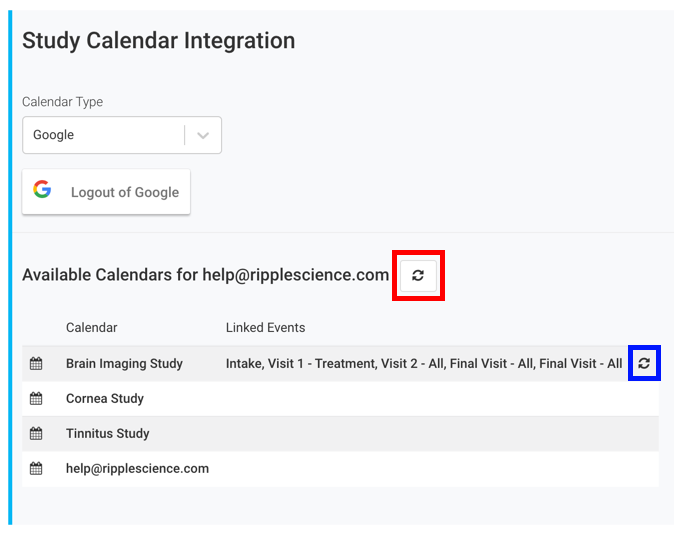Google Calendar Integration Overview
Ripple allows users to sync scheduled events with a selected Google Calendar, enabling seamless participant scheduling. Any changes made in Google Calendar, such as scheduling participants, updating event details, or editing descriptions, are automatically reflected in Ripple’s Events and study calendars.
Functionality of Google Calendar
Ripple’s integration with Google Calendar enables you to utilize all the features of Google Calendar while seamlessly linking appointments with scheduled events in Ripple. This integration eliminates the need to maintain separate calendars for Google and Ripple, streamlining scheduling and keeping appointments on track.
Setting Up Your Integration
Before Integrating Google Calendar with Ripple
Before setting up your Google Calendar integration, ensure your team has the following:
-
A Compatible Web Browser
Use a web browser that supports Google Calendar and third-party authorizations, such as Chrome, Edge, or Firefox. -
A Google Account
A Google account is needed to create and manage study calendars. This account can be:- An individual account (e.g., the Principal Investigator's or Site Administrator's account).
- A dedicated account exclusively for the study.
-
Custom IDs for Participants
Custom IDs are used to identify study participants. Learn more about Custom IDs here. -
Separate Calendars for Each Study
Create a separate calendar within the Google account for each study in Ripple.Steps to Create a New Calendar:
- Go to Google Calendar.
- Click the plus (+) button next to Other calendars.
- Follow the prompts to create and name the calendar.
By preparing these essentials, you can ensure a smooth integration process!
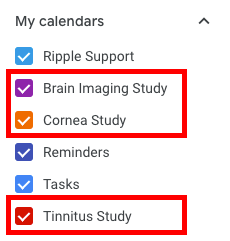
Getting Started with Google Calendar Integration
Note: The integration process must be completed by a Study Admin with login access to the associated Google Calendar.
Follow these steps to set up your Google Calendar integration:
-
Link the Selected Google Account
- Navigate to the Study Settings tab (green).
- Go to the Scheduling section (red) and locate the Study Calendar Integration page.
- Select "Google" from the drop-down list (purple).
-
Authorize Access
- You’ll be prompted to log in via Google’s login portal.
- Allow Ripple to access your calendar.
-
Confirm Study Calendar Integration
- Once connected, all available Google Calendars linked to the account will appear in Ripple.
- This list will include your study calendars and any other calendars associated with the Google account.
-
Link Google Calendars to Ripple Events
-
Navigate to the Events Setup section on the Study Settings page.
-
If study Events are not already set up, pause the calendar integration process to configure study Events. (Learn how to set up Events here.)
-
After setting up study Events, select the appropriate study calendar for the Event.
Example: If the Event is part of the Brain Imaging study, select the "Brain Imaging" calendar from the drop-down list.
-
By following these steps, you’ll successfully integrate Google Calendar with Ripple to streamline event management!
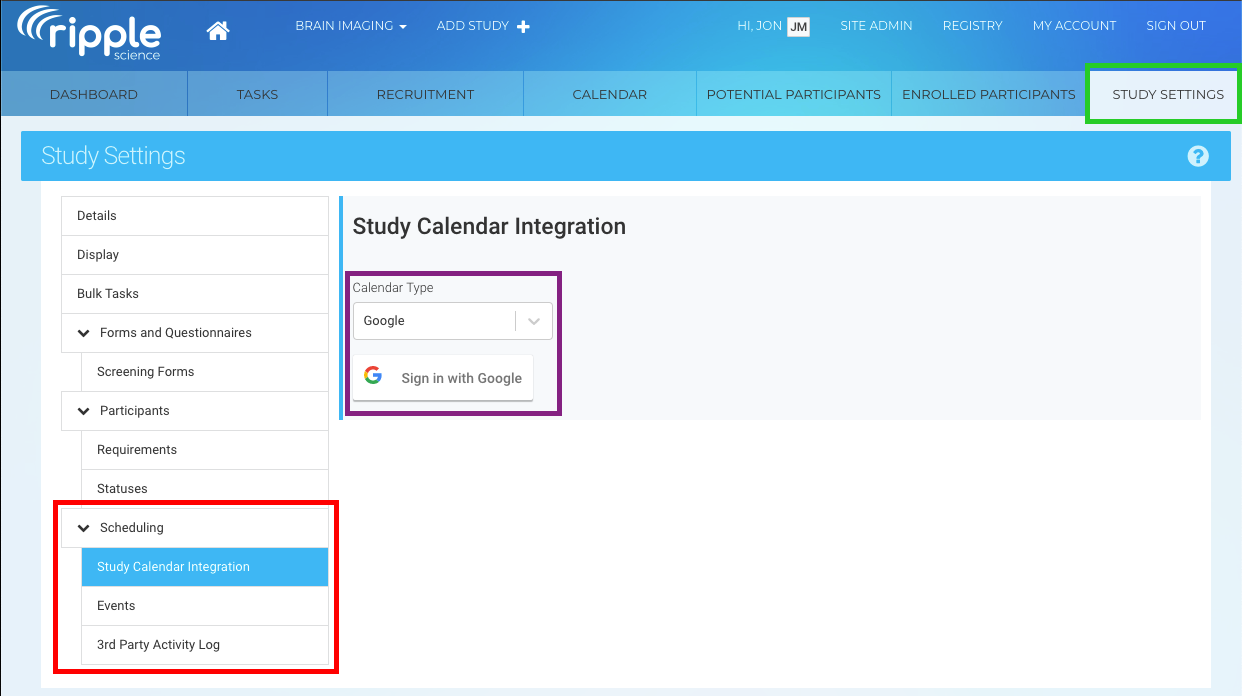
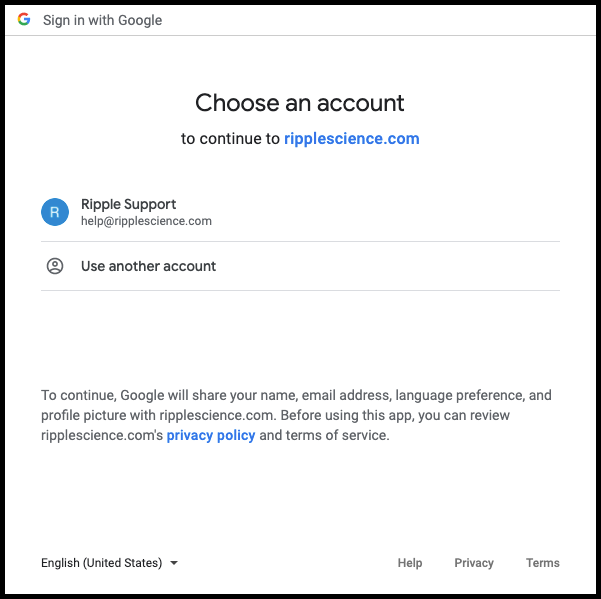
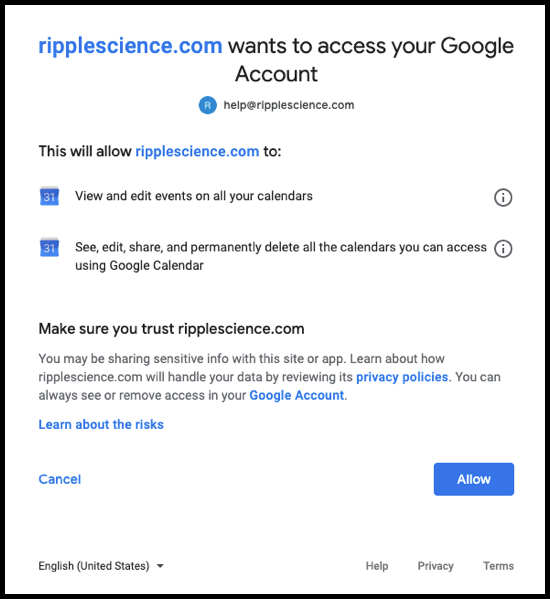
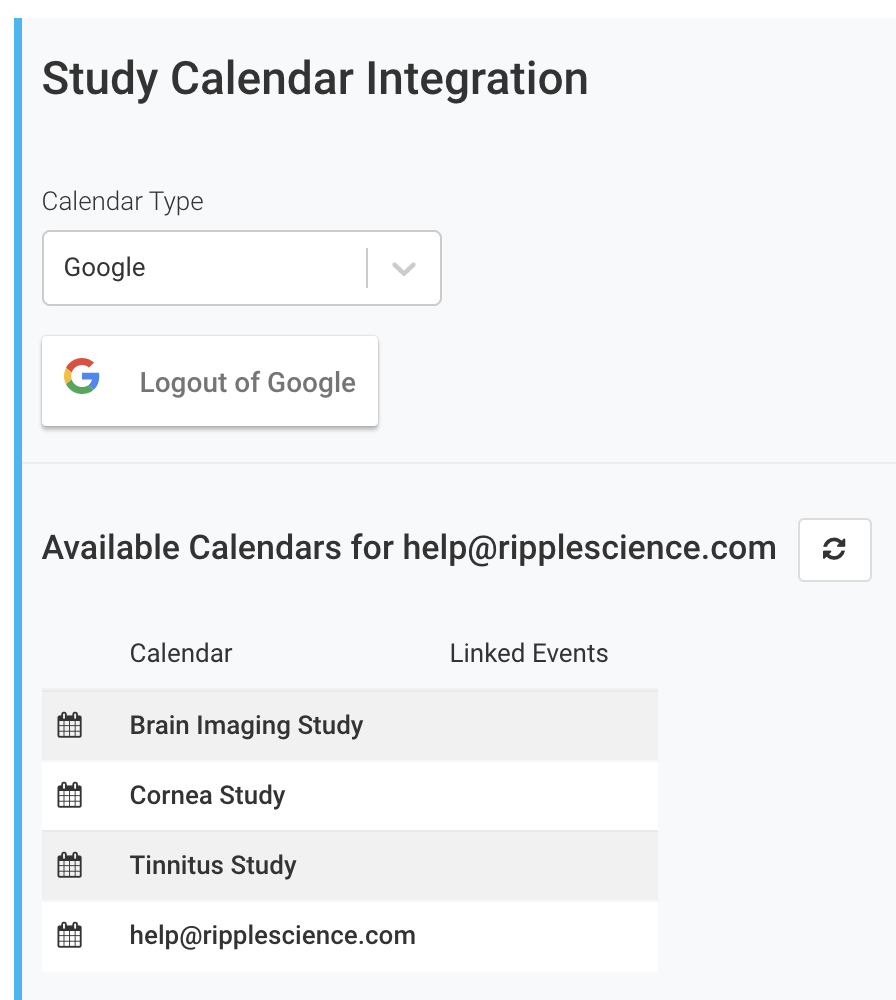
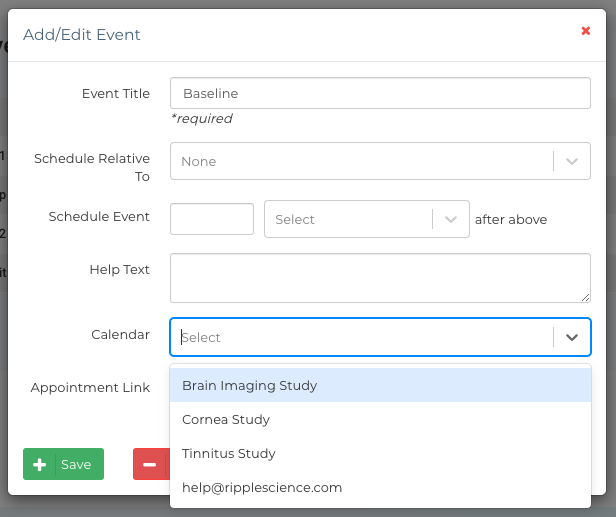
The Study Calendar Integration section should display all of your study's Events listed and linked to the corresponding study calendar. This confirms that the integration is set up correctly and that your Events are successfully synchronized with your Google Calendar.
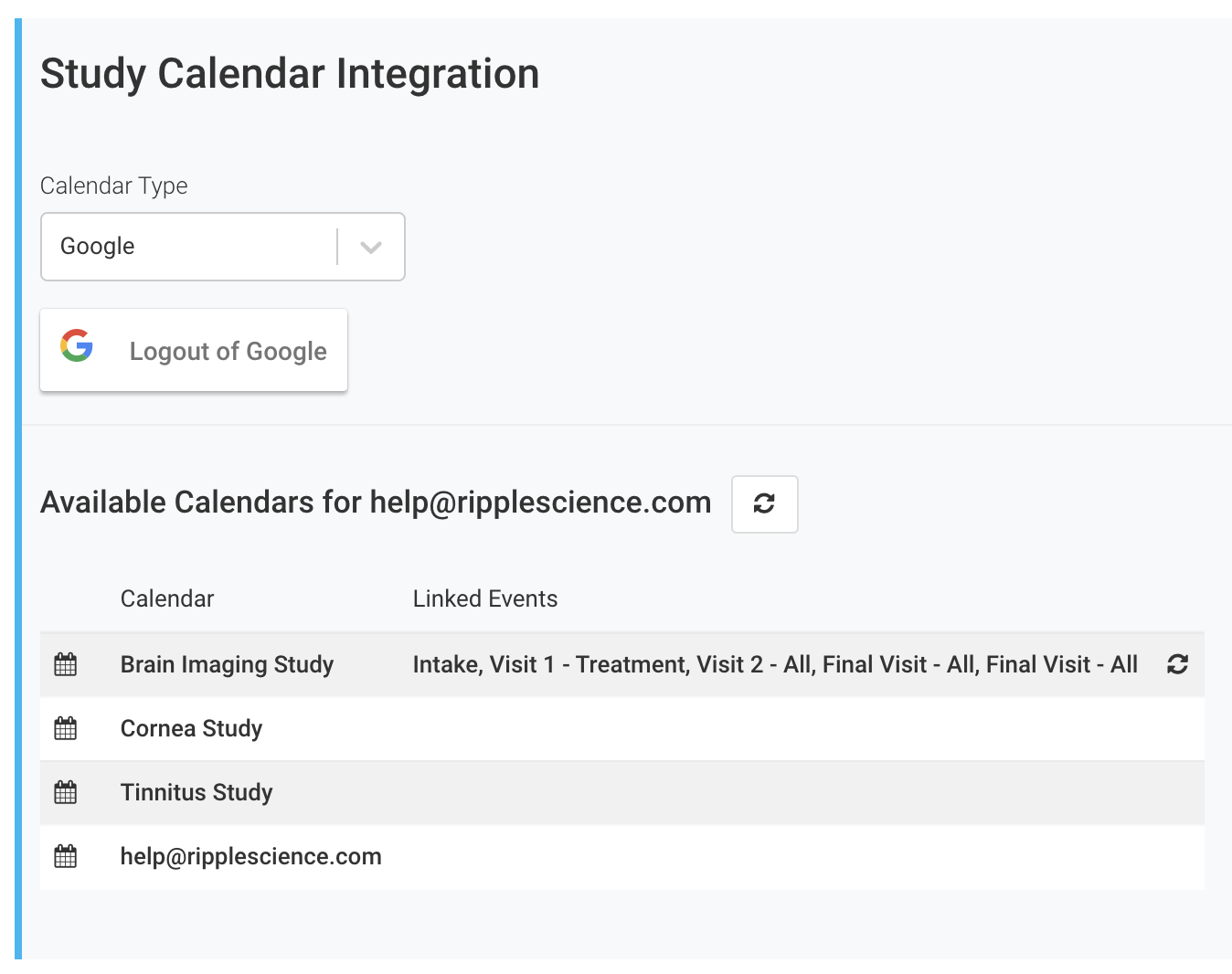
How Google and Ripple Calendars Interact: Using Event Identifiers
To ensure proper synchronization between Google Calendar and Ripple, all Google Calendar events must include a unique event identifier in brackets within the event’s title or description. This identifier is customizable in the event’s settings and is essential for linking the event type to a participant's profile in Ripple.
Proper Format
The correct format for event identifiers is: [event identifier].
- Example: For a sample event titled "Visit 2 - All," the identifier could be [V2All], resulting in the event title:
Visit 2 - All [V2All].
Key Notes
- No spaces or additional characters are allowed inside the brackets.
- Only identifiers in the specified format will be recognized and linked to Ripple.
By adhering to this format, you ensure that Google events are accurately linked to Ripple’s event types and participant profiles.
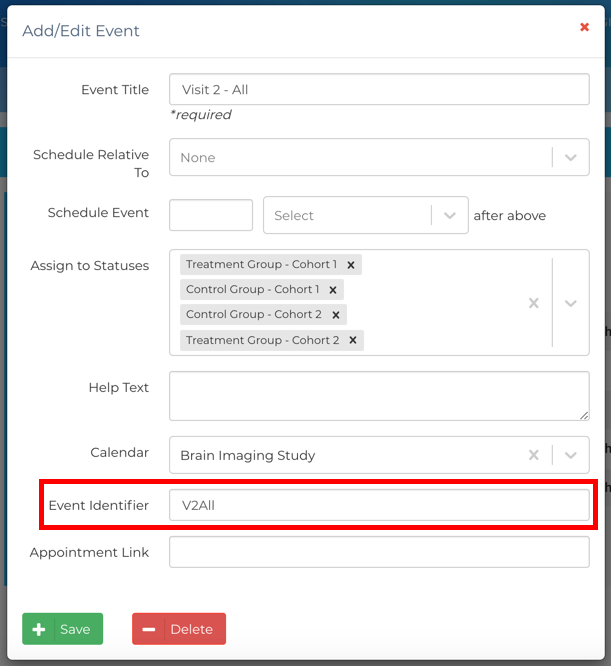
Using Custom IDs
To properly link Google Calendar events to participants in Ripple, each event must include the participant’s Custom ID with a hashtag (#) in the title or description. This ensures the event is associated with the correct participant in Ripple.
Proper Format
The correct format for Custom IDs is: #(Custom ID) with no spaces.
- Example: For a participant with the Custom ID 2004, include
#2004in the event title or description.
NOTE:
- No additional characters or spaces should be included in the Custom ID format.
- All participants must have a Custom ID in Ripple to schedule events for them.
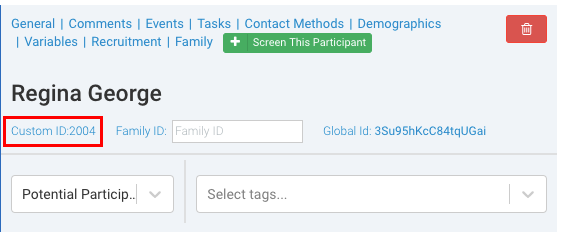
To learn more about scheduling linked Events in Ripple, you can explore detailed guides and instructions provided in the platform’s resources or documentation Here .
Third Party Activity Log
The Third Party Activity Log in Ripple tracks all changes to Ripple Events made via Google Calendar. This includes:
- Creating new events.
- Rescheduling or canceling events.
- Logging error messages when events fail to sync properly.
Common Error Messages and Causes
-
CustomId/attendee not found
- Cause: The event title or description did not include a Custom ID identifier, and no attendee email was found.
-
Participant not found
- Cause: A Custom ID or attendee was found, but it does not match any participant in the study.
-
Participant event not found
- Cause: The participant was identified, but they have no event of the specified type in the study.
-
Event not found for calendarId: {XYZ}
- Cause: No matching event exists for the syncing calendar and study, possibly due to lingering syncing issues if a calendar was recently removed from the integration.
-
Participant multiple events of same type
- Cause: Two events of the same type are scheduled for the same participant, indicating double-booking.
-
All-day events are not supported
- Cause: Events must have a specific time set, as all-day events cannot sync with Ripple.
Importance of the Activity Log
The Activity Log ensures transparency and helps troubleshoot any syncing issues, allowing you to resolve errors and maintain accurate event scheduling within Ripple.
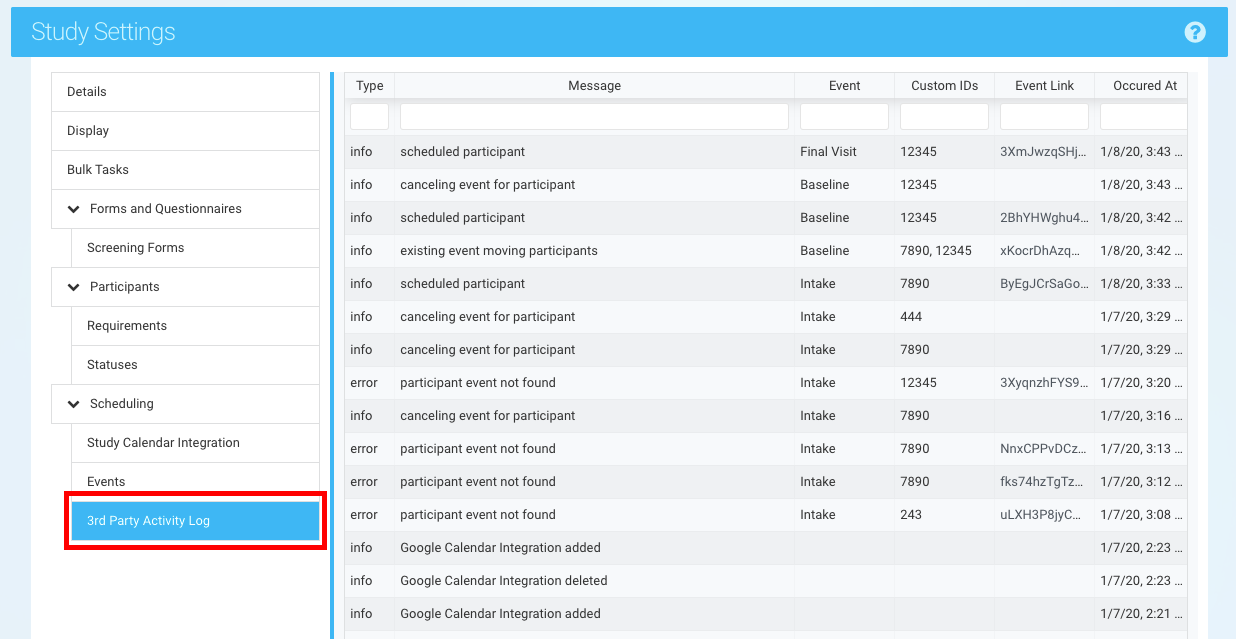
Common Errors in Google Calendar Integration
Here are common errors that can occur when integrating Google Calendar with Ripple, along with their consequences:
-
Creating an Event Without a Custom ID or an Invalid/Improperly Formatted Custom ID
- Issue: The event will not sync to Ripple and will only appear in Google Calendar.
- Fix: Ensure the Custom ID is included in the title or description in the correct format (e.g.,
#2004).
-
Creating an Event with Two Custom IDs
- Issue: Only the first Custom ID in the title will be scheduled to the participant. This link will remain even if the event title is changed to include a different Custom ID.
- Fix: Only include one Custom ID per event to ensure the event is properly scheduled for the correct participant.
-
Scheduling the Same Event Multiple Times for the Same Participant
- Issue: If two identical events are scheduled in Google Calendar for one Custom ID, only the first event created will sync to Ripple. The order of the event occurrence does not matter.
- Fix: Avoid duplicating the same event for a participant in Google Calendar.
-
Creating an All-Day Event
- Issue: Ripple does not support all-day events. Events without start and end times will not sync.
- Fix: Ensure all events have specific start and end times.
-
Creating Identical Events for a Participant
- Issue: If two identical events of the same type are created for a participant, the most recently updated event will be reflected in Ripple.
- Fix: Avoid creating duplicate events. If updates are needed, modify the existing event rather than creating a new one.
By avoiding these common errors and adhering to the proper guidelines, you can ensure a smooth synchronization between Google Calendar and Ripple.
Resolving Syncing Errors
If your Google Calendar and Ripple Events are not syncing, and the issue isn’t caused by one of the common errors, you may need to refresh the integration by manually syncing the specific calendar or your Google connection.
Steps to Manually Sync
-
Sync a Specific Calendar (Blue)
- Locate the calendar associated with the syncing error.
- Click the sync icon next to the specific calendar link to manually sync all events within that calendar.
-
Sync All Calendars in the Integration (Red)
- Locate the email associated with the Google Calendar account.
- Click the sync icon next to the email to sync all calendars linked to the integration.
- This step is especially important when adding or removing a Google Calendar from the integration.
